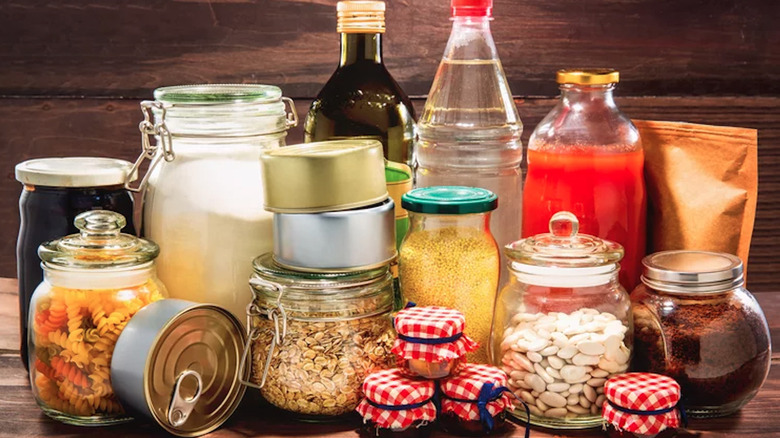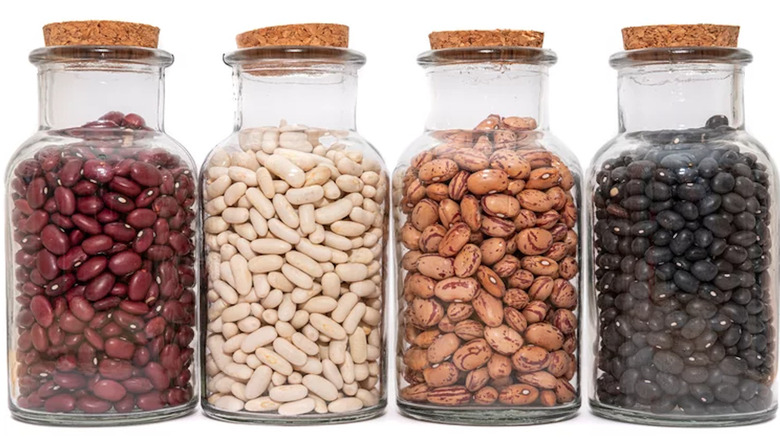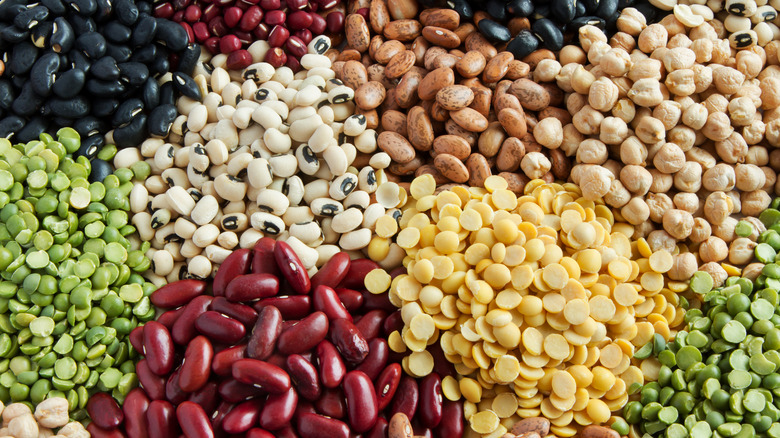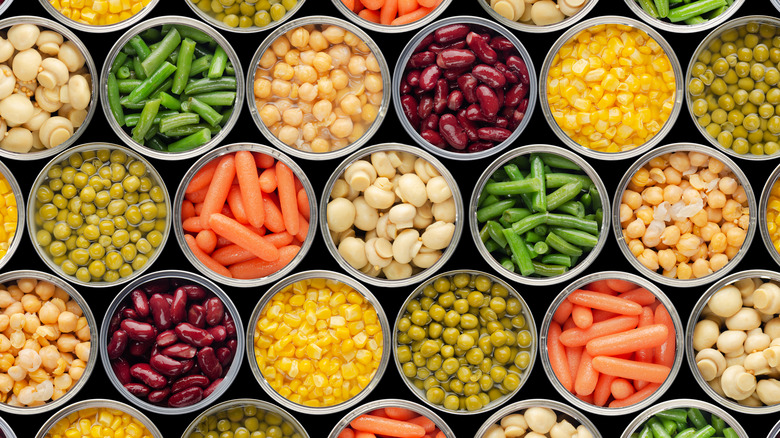This Canned Food Won't Expire For Almost 30 Years
A well-stocked pantry includes basic ingredients you should always have on hand. If you're a salt-of-the-earth survivalist or just someone who wants to keep a steady budget, canned foods are an option you'll want to take. You might wonder what canned foods are the best to stock up on, and which have a long shelf life. After all, no one wants to be stuck with cans of food that will go bad before you even get to eat them.
The New Survivalist claims that, while all canned food can last a good few years, canned meats and vegetables can last the longest. Surprisingly, canned meat can last on your shelf from four to 10 years, and canned vegetables can have a shelf life of three to eight years. The acid in foods like grapes and tomatoes makes them deteriorate more quickly. The Prepping Guide also suggests that certain dehydrated foods, such as carrots and corn, can last for 10 to 25 years.
While these are important foods to stock up on, there are some foods that, with proper storage, can last you for as long as 30 or more years.
Beans withstand the test of time
Mental Floss lists ten foods that are renowned for never — or at least almost never — going bad, no matter how long it has been. Included in the list are hard liquors, syrups, salt, dried beans, and white rice. These are all staples of any prepping or long-term storage stash, but while alcohol has sterilization properties and salt is used for preserving meats, what exactly makes beans such a necessity?
According to Today, canned cooked beans last five years or longer, similar to other canned vegetables and legumes. However, researchers at Brigham Young University found that canned dried beans can last several times as long. They ran an experiment on the quality of dried beans after 30 years. The results showed that the beans had suffered some loss of quality, unavoidable due to the amount of time that passed, but were still perfectly acceptable to eat. The Provident Prepper also tested dried beans after 18 years instead of 30. These dried beans were sealed in large cans, and they noted a "sweet metallic smell" after opening the cans. However, after the beans were rinsed, the smell quickly went away. The scent is a product of long-term canning, the outlet explained. The beans were able to be made into 15 different meals that the preppers claim tasted delicious.
Dried beans are often canned at home using a pressure canner, per Grow A Good Life, but can also be purchased from companies providing emergency essentials like Good 2 Go Co.
Proper storage is key to the longevity of beans
How long beans will last depends on how one stores the beans. Utah State University discusses the ideal conditions to store dried beans. The key is eliminating oxygen contact. Either a No. 10 can or a Mylar-type bag are best, but canning jars are also suitable for small quantities. Oxygen absorbers should also be used within the packaging, and the containers should be kept in a cool, dry, and dark place. Sudden changes in temperature or prolonged exposure to temperatures above 75 degrees Fahrenheit can cause spoilage according to the University of Minnesota Extension.
Ready Squirrel notes that many readily available dried beans make great candidates for long-term storage such as adzuki, kidney, black-eyed peas, and black and navy beans. Pinto beans have been the subject of multiple studies so they are a sure bet. Split peas and lentils, though not actually beans, also are great options. Soybeans will keep for up to 10 years, but their higher oil content means they will spoil more quickly than other types of beans.
Safety precautions are important with long-term storage
The University of Minnesota Extension warns against signs of deterioration with canned foods. Severe rusting can cause tiny holes which sacrifice the integrity of the can. It is also important to look for signs that bacteria or yeast has grown inside the can. The warning signs include "loose or bulging lids on jars, bulging, leaking or badly dented cans (especially along the top, side and bottom seams), and foul odor."
Improperly canned foods could cause botulism, according to the Centers for Disease Control. Botulism is caused by the bacteria Clostridium botulinum, and can lead to paralysis, breathing difficulties, or death. This bacteria causes no change in taste, sight, or smell of the canned food, but can be fatal even when consumed in small quantities. For this reason, It is very important to carefully inspect cans for signs of damage.
Storing beans in a clean and proper way ensures you'll have plenty of food supply for years to come. The many amazing recipes to make with a can of beans means that whether you're hunkering down for a pandemic, hiding out in a bunker, or if you're just focusing on frugality, you'll always have something delicious and nutritious to eat.



